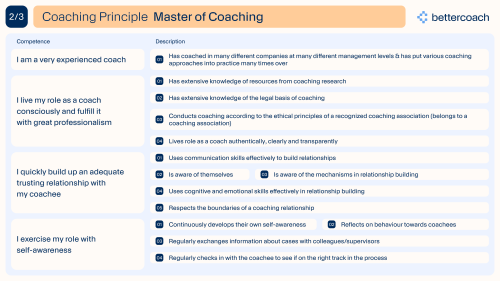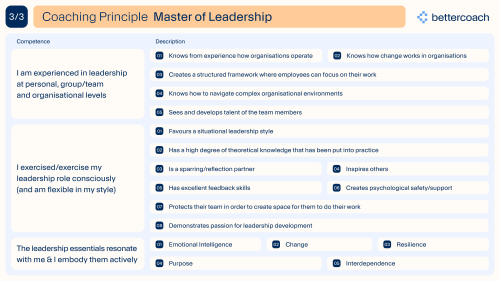In our team, we all share the conviction that coaching is a powerful means to support people’s growth, and that it can make a real difference in people’s lives. But coaching can only be that if we look closely at what makes it so successful. This is the essential idea that went into the numerous hours of researching, discussing, and defining the principles. We actually were aligned quite fast on the three main principles, and then spent much time on the details: What does each principle mean to us?
Through the coaching principles, we want to be more aligned on what high quality coaching means to us, and provide more transparency of our coaching standards – towards our clients, our coaches, and also ourselves as a team.
What is important to say is that the coaching principles represent what we already do. So our core processes don’t change, we just use the principles to refine them.
Since we are not inventing anything new, and rather defined the coaching principles to help us clarify our understanding of excellent coaching (and of an excellent coach), I’d say that we and our coaches already embody the culture inherent to these principles.
We see the coaching principles as guidelines rather than rules. For sure, they inform our coach onboarding and regular assessment that we do with all coaches. It’s not always super easy and objective to create these measures – after all, the coaching principles entail many soft, vague, human factors. Besides quantitative data like certifications, number of clients, hours spent coaching, hours spent in supervision and so on, we use self-assessments, client ratings and feedback, the onboarding interviews and project-related work with the coaches to evaluate the fit. After some years of experience, we really must say that we get a full understanding and assessment not merely by data, but by authentic exchange with coaches as well as clients. Practice makes experience – this counts for the coaches as well as for us.
Besides better alignment and clear expectations among us and our stakeholders, we hope for the coaching principles to fuel our mission to support people in their growth and in their path to being fulfilled. Coaching is always a very individual process and hence there is no secret success recipe when a coaching is good and when it isn’t. But these key principles shall ensure that everyone who receives coaching through a bettercoach coach has the best condition to make it a successful coaching. One that leads to growth and fulfillment. This is what we want for the world, and what I feel as the spirit of bettercoach. I truly enjoyed working on the principles with my colleagues, they fill me with purpose and passion – and so I hope they will help fill others with purpose and passion in turn.






